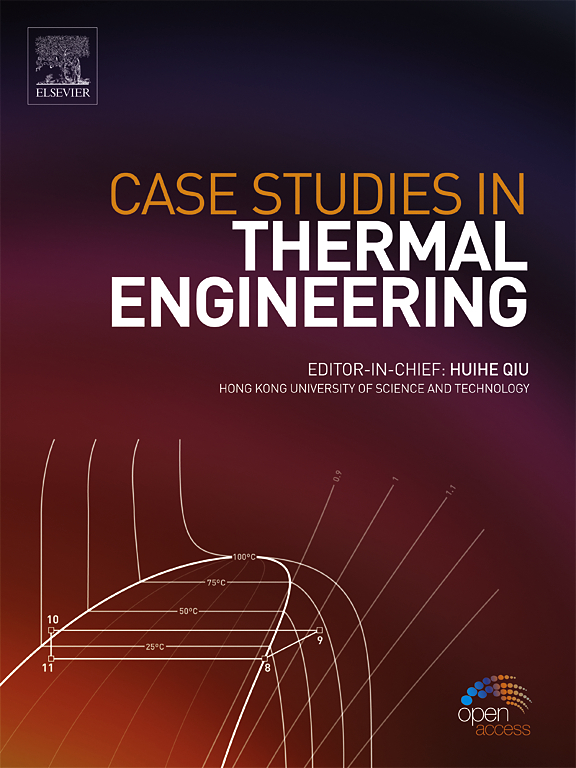基于有机朗肯循环系统的工质类型与热源匹配特性实验研究
IF 6.4
2区 工程技术
Q1 THERMODYNAMICS
引用次数: 0
摘要
具有低沸点的有机物在加热时很容易转化为高压气体,使其适用于ORC(有机朗肯循环)系统来回收低温废热。采用kw级ORC实验系统,以氢氟碳化物为工质,对低温热源的回收过程进行了研究。通过改变工质类型、工质填充量(WFFQ)和HST,探讨了系统在不同工况下的性能。在高温温度为100℃时,当WFFQ从5 kg增加到10 kg时,R134a的理论轴功率为0.332 ~ 1.341 kW, R245fa为0.555 ~ 1.9147 kW, R227ea为0.372 ~ 1.067 kW。热效率分别为2.084 ~ 4.739%、3.136 ~ 5.878%和4.525 ~ 6.448%。在高温温度为120℃时,R134a的理论轴功范围为0.517 ~ 1.569 kW, R245fa为0.703 ~ 2.165 kW, R227ea为0.445 ~ 1.158 kW;热效率分别为3.500 ~ 5.563%、3.889 ~ 6.303%和5.446 ~ 6.454%。本文章由计算机程序翻译,如有差异,请以英文原文为准。
Experimental study on the matching characteristics of working fluid types and heat sources based on the organic Rankine cycle system
Organic substances with low boiling points can be easily converted into high-pressure gases when heated, making them suitable for ORC (organic Rankine cycle) systems to recover low-temperature waste heat. This study investigated the recycling process of a LTHS (low-temperature heat source) using a kW-scale ORC experimental system with hydrofluorocarbon as the working fluids. The system performance under various operating conditions was explored by changing the type of working fluids and WFFQ (working fluids filling quantity), as well as HST. When the WFFQ increased from 5 to 10 kg at a HST of 100 °C, the theoretical shaft power of the expander ranged from 0.332 to 1.341 kW for R134a, 0.555–1.9147 kW for R245fa, and 0.372–1.067 kW for R227ea. Corresponding thermal efficiency ranged from 2.084 to 4.739 %, 3.136–5.878 %, and 4.525–6.448 %, respectively. At a HST of 120 °C, the theoretical shaft work of the expander ranged from 0.517 to 1.569 kW for R134a, 0.703–2.165 kW for R245fa, and 0.445–1.158 kW for R227ea; thermal efficiency ranged from 3.500 to 5.563 %, 3.889–6.303 %, and 5.446–6.454 %, respectively.
求助全文
通过发布文献求助,成功后即可免费获取论文全文。
去求助
来源期刊

Case Studies in Thermal Engineering
Chemical Engineering-Fluid Flow and Transfer Processes
CiteScore
8.60
自引率
11.80%
发文量
812
审稿时长
76 days
期刊介绍:
Case Studies in Thermal Engineering provides a forum for the rapid publication of short, structured Case Studies in Thermal Engineering and related Short Communications. It provides an essential compendium of case studies for researchers and practitioners in the field of thermal engineering and others who are interested in aspects of thermal engineering cases that could affect other engineering processes. The journal not only publishes new and novel case studies, but also provides a forum for the publication of high quality descriptions of classic thermal engineering problems. The scope of the journal includes case studies of thermal engineering problems in components, devices and systems using existing experimental and numerical techniques in the areas of mechanical, aerospace, chemical, medical, thermal management for electronics, heat exchangers, regeneration, solar thermal energy, thermal storage, building energy conservation, and power generation. Case studies of thermal problems in other areas will also be considered.
 求助内容:
求助内容: 应助结果提醒方式:
应助结果提醒方式:


